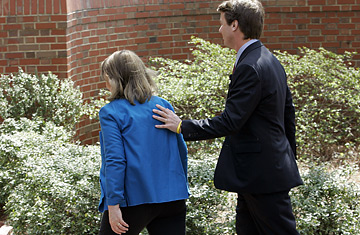
Democratic Presidential hopeful John Edwards and his wife Elizabeth leave a news conference after speaking with reporters about Elizabeth's recurrence of cancer in Chapel Hill, N.C., Thursday, March 22, 2007. Edwards will continue his campaign for the presidency.
Instead, Edwards said nothing would change; his campaign would continue and Elizabeth would be by his side on the road. Elizabeth spoke about the importance of her husband's campaign, how the country needs him to be President. Both said there was never a debate yesterday, as they were receiving the news about her condition, about whether he should drop out of the race. John said that when the two of them were alone, Elizabeth was concerned about everyone but herself — her children, her husband and her country, in that order, but not herself.
He clearly meant it to be inspiring, but there is also something discomfiting about that statement. Even more discomfiting was Edwards' claim that by soldiering on while his wife has incurable cancer, he would be proving that he could deal with the pressures of being President. I wonder how voters will react to that sentiment.
Edwards is staying in the race, so the effect of today's announcement on the Democratic contest will be limited. But there will be an effect. Despite his and his wife's optimism, political professionals, donors, activists and regular voters will all have to wonder going forward whether or not Edwards will be able to stay in the race all the way to the end. It is certainly true that with effective treatment, Elizabeth Edwards could live many years. But it is also true that even the best treatment isn't always effective, and that bone cancer is particularly lethal. Edwards' supporters, and surely many average Americans, have to be wondering at what point the candidate will decide that his duties as husband and father to three children, including a 6- and 8-year-old, trump his duty to his country and the cause of winning the White House.
Hillary Clinton and Barack Obama have so far overshadowed Edwards in this race, but he is a top-tier candidate and a real threat to win the nomination. He leads most polls in the key first-caucus state of Iowa, which he came close to winning in 2004. To put it bluntly, Edwards is the leading white male Democratic contender for a job that has only ever gone to white males. If, in the future, he either suspends his campaign or drops out of the race entirely, his supporters will have to look around and decide which of the remaining candidates comes closest to fulfilling the promise they saw in him.
And the choice won't be obvious. Unlike many southern Democrats, Edwards is not a conservative or moderate in the mold of Bill Clinton. In the 2008 race, he had positioned himself as the most populist and liberal of the serious contenders for the nomination. In a time of war and terrorist threats abroad, Edwards chose a decidedly domestic, and almost anachronistic, theme around which to build his campaign — the fight to eradicate poverty in America. Will Clinton or Obama take up that banner? Not likely.
If his wife's cancer at some point forces Edwards to withdraw, who would benefit? Though decidedly second-tier candidates, Senators Joe Biden and Chris Dodd would suddenly become the leading white male contenders for the nomination. But neither is a natural replacement for Edwards. Biden is running almost entirely on the strength of his foreign policy experience. Dodd is running as a Washington veteran who can get things done. Neither is plausible as a populist.
But Al Gore is. If Edwards goes, Democrats unsatisfied with the field will see a new and compelling rationale for a Gore candidacy.
